
Senior psychologist in Aurora
Merrylord Harb-Azar is a senior psychologist at Wollongong Clinic South Coast Private Hospital of Aurora in Sydney, Australia. She is currently the PTSD coordinator and second-in-command (2IC) for clinical programs at the clinic, overseeing the PTSD group and intensive program as well as its new and innovative treatment protocol. PTSD stands for Post-Traumatic Stress Disorder. It’s a great honor for the editor to have a brief interview with Merrylord and take a closer look at her work, especially with respect to PTSD.
The details of the interview are as follows.
A brief introduction of Merrylord Harb-Azar
My name is Merrylord Harb-Azar. I’ve been a psychologist and senior psychologist for over 15 years. I graduated from the University of Wollongong (UOW) and am experienced in working for private practices and non-goverrnment organisations (NGOs). Currently, I’m with the Wollongong Clinic at South Coast Private Hospital as Senior psychologist and 2IC of clinical programs. At the clinic, I perform both one-on-one work and group work, provide supervision for staff, conduct PTSD assessments regarding suitability for the program, review files, take care of program development, and liaise with multiple internal and external stakeholders.
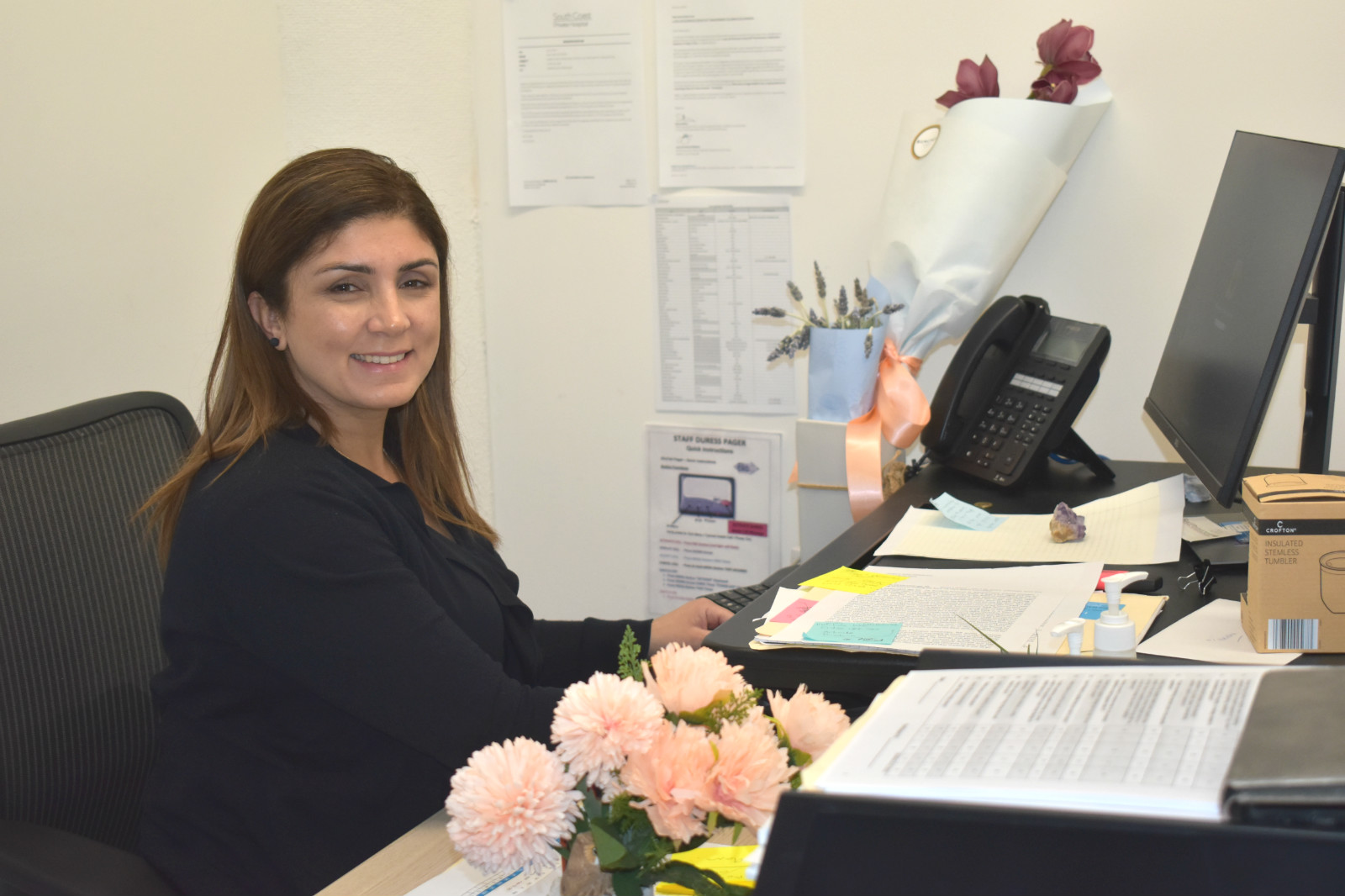
Merrylord Harb-Azar in her office
About the PTSD Program
This initially started as a group program and soon after Merrylord realized much more was needed to support the clinic’s PTSD patients, specifically pyschoeducation targeting trauma. I was the first clinician in the hospital to ever run an intensive trauma treatment program and from this, the PTSD program has developed into a two-phase treatment.
"Ms. Harb-Azar delivers the PTSD group program and leads the phase II program which incorporates trauma focused gognitive behavioural therapy (CBT), cognitive processing therapy, and eye movement desensitization and reprocessing therapy (EMDR).
She continues to work tirelessly in this area to deliver the best practices and innovative techniques around PTSD and its care. "
The inpatient PTSD program is a unique and blended approach to treatment. Guided by Phoenix Australia, our innovative treatment is a two-phase process. The initial phase (phase I) is an inpatient group program exploring what PTSD is, managing and containing symptoms, understanding emotions and the patients themselves.
Patients also receive individual treatment during this phase which assists in future treatment recommendations. If assessed as suitable, some patients will return to complete the second phase (phase II) of the PTSD program which is the trauma-focused individual treatment. Phase 2 started off as a 10-week program, but now due to the blended approach, it is a 4 to 6 week program, which achieves the same results in less time.
What are the challenges and opportunities of the PTSD program?
Opportunities – It is a unique program due to the blended nature of the program. When patients leave the program, those who have scored in the normal range of the pyschometrics for PTSD are considered to have completed the intensified treatment. This can’t be achieved in an outpatient setting.
Challenges - Working on trauma on a daily basis, it’s important that we as facilitators are careful of our own traumas. There is high demand for the program and currently, we have an extensive wait list which we’re working through to accommodate our patients.
Share with us something about the Australian Governor-General’s visit to South Coast Private on the World Mental Health Day and shed some light on PTSD treatment.
The Governor-General, His Excellency General the Honourable David Hurley, AC, DSC (retd), visited South Coast Private last October for World Mental Health Day. This visit was based on the recognition of our PTSD program, which gained the interest of the Governor-General. To recognize the excellent work of the PTSD program, the Governor-General and Her Excellency Mrs Linda Hurley joined dignitaries, current and ex-serving defence personnel in the discussion of evidence-based and innovative treatment for patients who have engaged in treatment at South Coast Private.

From left to right: Karen Guyer, Peter Kahn , Dr. Al Griskaitis, Merrylord Harb-Azar, His Excellency Governor-General the Honourable David Hurley, Mrs Linda Hurley, Kim Capp (CEO of South Coast Private), Glen Barrington and Christopher Mahoney.
I was really excited and really proud to showcase our program. It was definitely one of the highlights of my career, being able to talk through our hard work and the excellent results to the Governor-General.
What interests you the most about your current position ?
Being able to be innovative in treatment and provide different elements of the program. I love the diversity in my role, which allows leadership and supervision , whilst still being able to provide therapeutic treatment. From an administrative point of view, being 2IC, training and developing our current staff with unique developmental skills to lead and engage with our patients during their PTSD treatment is rewarding. I provide training to ward staff at South Coast Private Hospital on how to work with PTSD patients, and also provide nursing supervision.
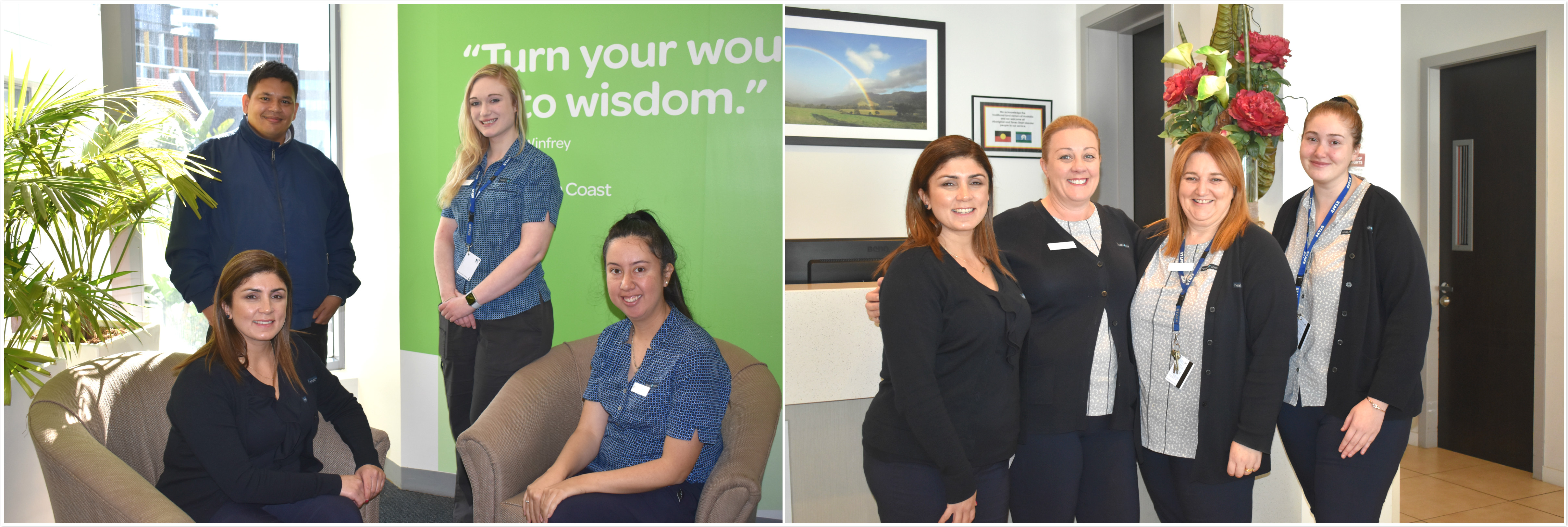
(left)Ms. Harb-Azar photopgraphed with South Coast Private’s Level 4 nursing staff
(right)Ms. Harb-Azar photopgraphed with South Coast Private’s ground floor receptionists and administration staff
How does your team collaborate?
We are a multidisciplinary team with different roles and responsibilities. In terms of PTSD, the team is allocated patients in either phase 1 or phase 2, providing supervision. This allowstwo-way engagement, which I like to call a reflective supervision practice. I focus on strengths, but also ways to further harness these skills which are eventually reflect in patient care and the ultimate success of the program.
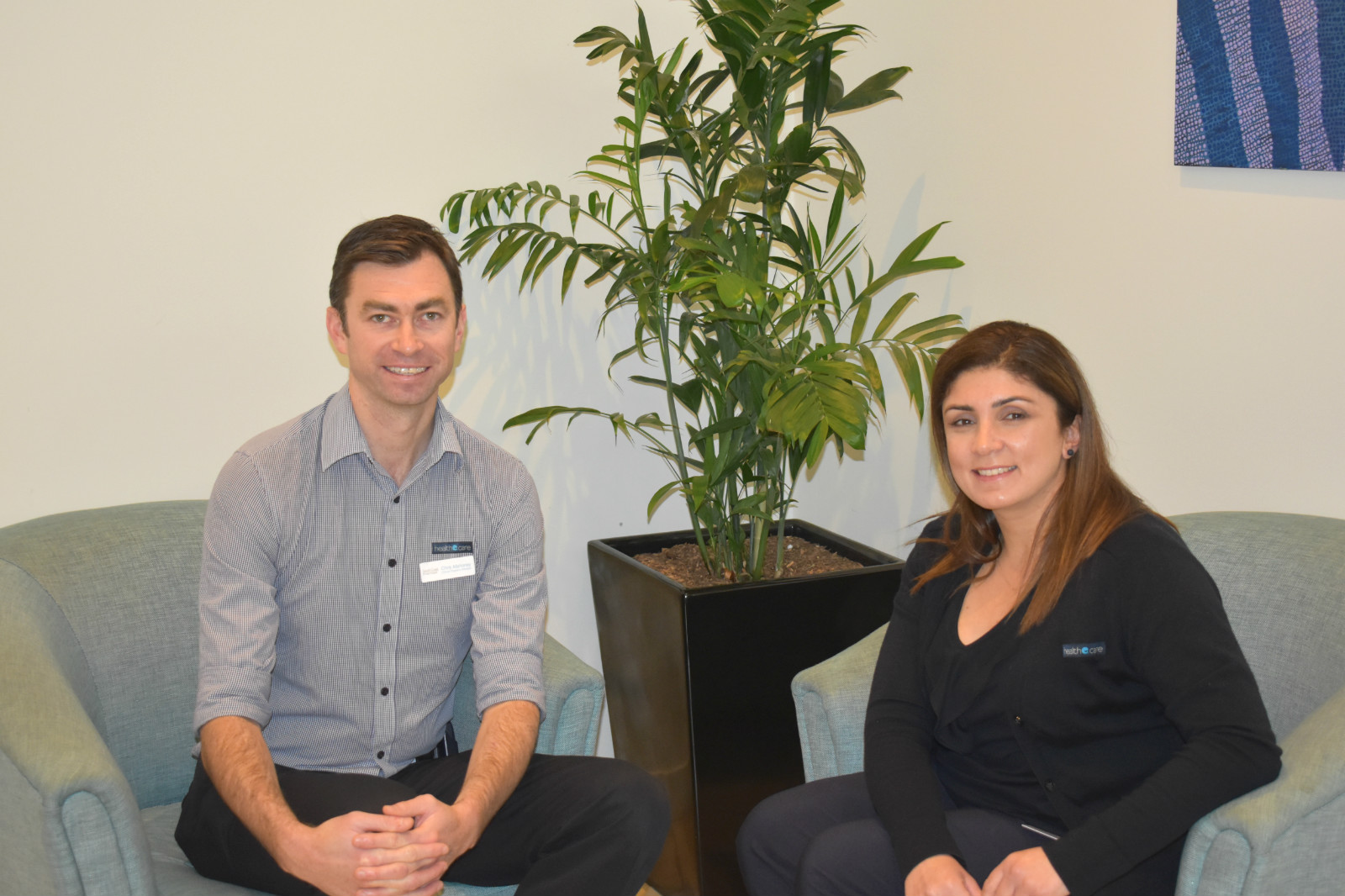
Ms. Harb-Azar with Christopher Mahoney (program manager)
What is your work style and ideal team culture?
I’m extremely flexible and adapt to change quickly. I love to collaborate. My ideal team culture is to work in a collegial and harmonious environment, and this is a reflection of my relationship with various stakeholders at South Coast Private.
To me, team culture is about empowerment of skills, diversity and appreciation of the various backgrounds and experiences towards the PTSD program, as well as our department. I believe in a strong, supportive and healthy work culture where everyone is heard, respected and appreciated – and a love of coffee doesn’t hurt either.
Share a story of you related to Covid-19.
I, along with my PTSD project member, psychiatrist Dr Williams, was interviewed by the Australia media Illawarra Mercury-ABC News in June. We both called for public awareness, supports and measures for mental health issues with the challenges brought about by coronavirus (COVID-19).
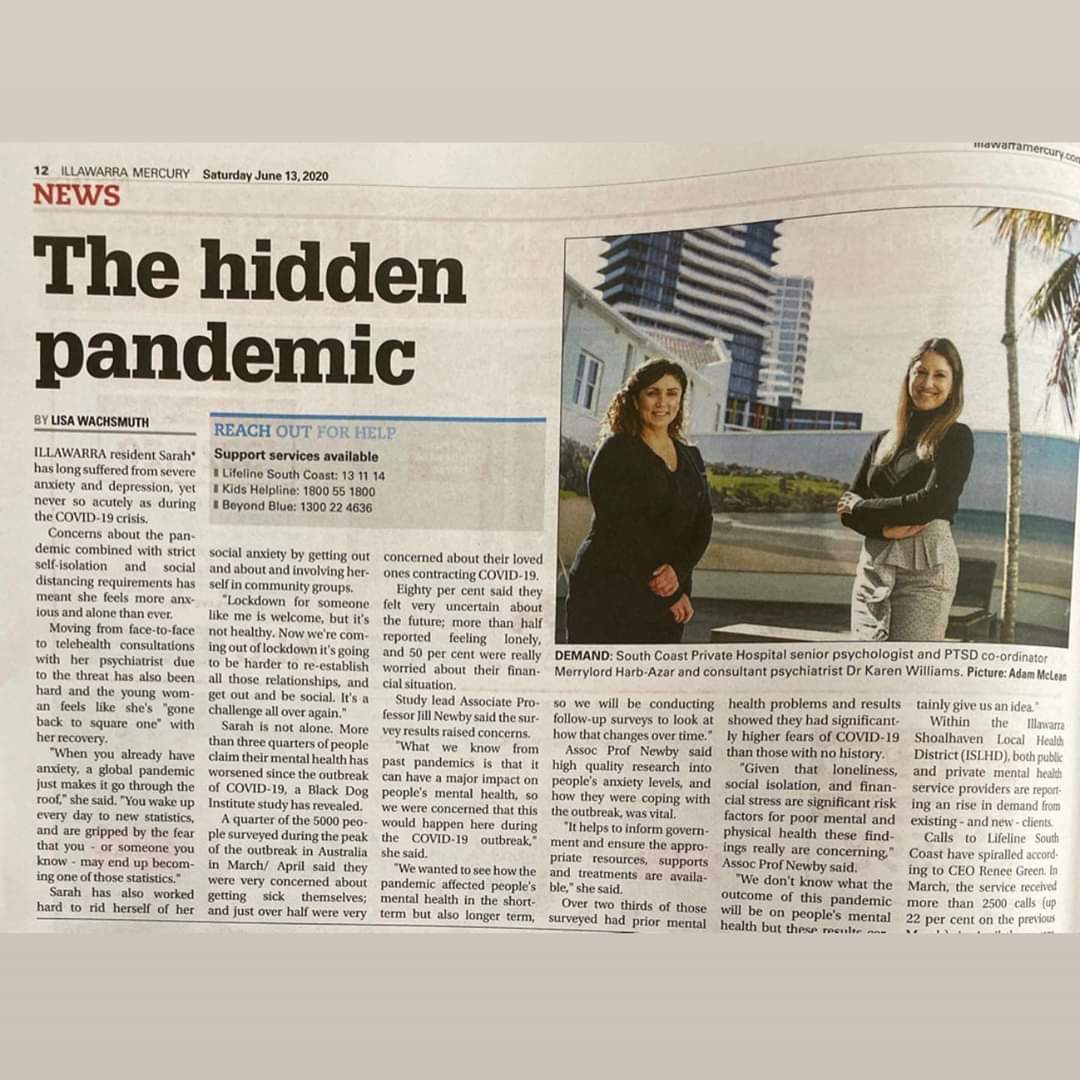
The coronavirus restrictions have made treatment difficult for people who exercise and socialize to address mental health issues.
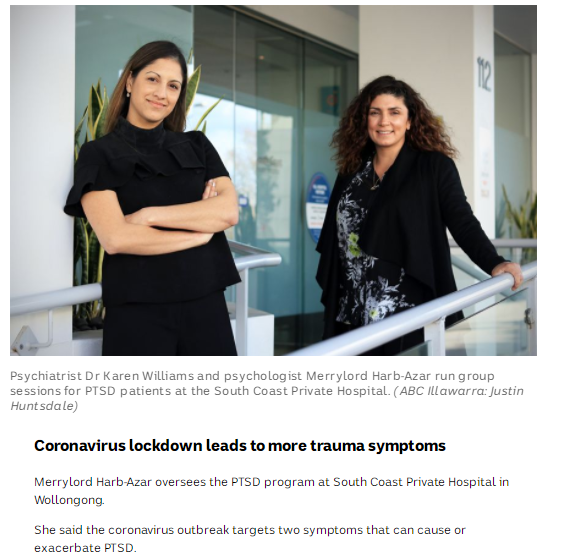
It also provided a valuable opportunity to promote PTSD treatment at South Coast Private, highlighting our dedicated ward that provides treatment for PTSD year round.
How to remain positive during the special times?
I love to cross-fit and Mauy Thai, and I’ve just taken up hip-hop dancing and imagine myself as Beyoncé’s backup dancer. My hobbies would definitely be my alone time, which keeps me grounded and happy, also releasing endorphins which, as we know, improves your mood.
One thing (outside of work) that has a great impact on you.
Definitely my family – my anchor. Coming from an ethnic background, education is very important to the success of first-generation Lebanese women. I’m extremely lucky that my parents empowered me to be the first-ever female in my family to attend university. I am very fortunate for the powerful impact of my parents, which has instilled these attributes and a love for learning. This is a reflection and impact of the PTSD program which I am extremely passionate about, and flows through positively to my patients and staff at South Coast Private.